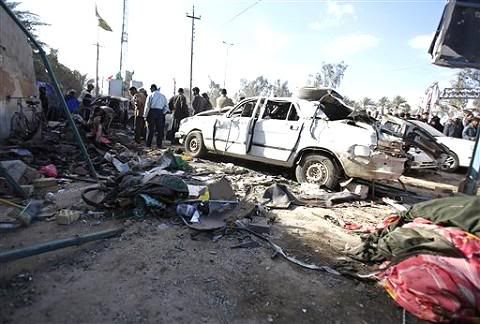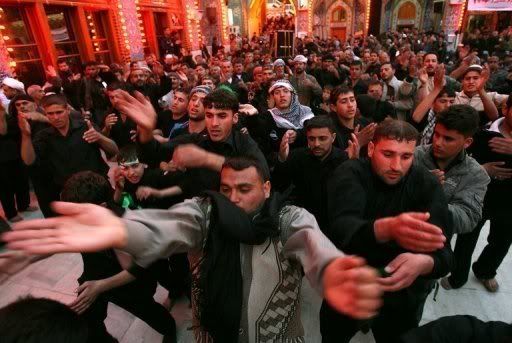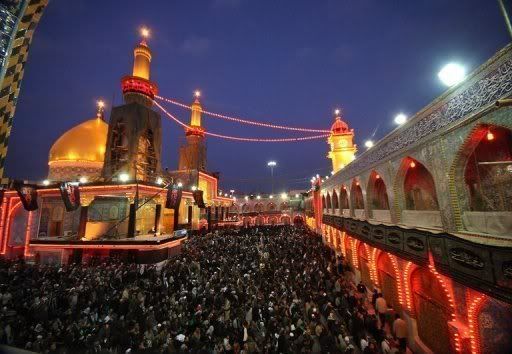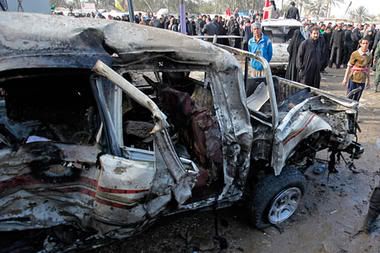People gather at the site of a bombing in the holy city of Karbala, Iraq, 05 Feb 2010


Shiite Muslim pilgrims perform a ritual as they mark the major mourning ceremony of Arbaeen in Karbala

Arbaeen marks 40 days after the Ashura anniversary commemorating the slaying of Imam Hussein

People gather at the site of a twin car bombing in the holy city of Karbala, Iraq, on Friday.
Iraqi police say at least 27 Shi'ite pilgrims have been killed and more than 70 wounded in a bombing on the outskirts of the holy city of Karbala, south of Baghdad.
The bombing, paired with a mortar attack, took place Friday as hundreds of thousands of Shi'ite pilgrims converged on Karbala for an important religious observance. The Arbain holy day marks the end of the mourning period for the death of a revered 7th-century Shi'ite cleric, Imam Hussein.
Friday's attack was the third this week against Shi'ite pilgrims, frequently targeted by Sunni insurgents.
The violence underscores political tension in the country over efforts to ban a group of politicians from participating in upcoming parliamentary elections.
Some Sunni politicians accuse Iraq's Shi'ite-led government of blacklisting candidates to consolidate power.
The list includes about 500 candidates with suspected ties to Saddam Hussein's Ba'athist regime.
An appeals court ruled this week that banned candidates could remain on the ballot, but must be cleared of links to the Ba'ath Party before being seated in parliament.
An Iraqi government spokesman Ali al-Dabbagh Thursday described the court's decision as illegal and unconstitutional.
Iraqi Prime Minister Nouri al-Maliki is convening a special parliamentary session Sunday to discuss the court's decision.
A U.S. State Department spokesman, P.J. Crowley, said the United States approves of lifting the ban so that the "widest possible field of candidates" can participate in the March 7 elections.
A mortar bomb attack on the last day of a major mourning ceremony in Iraq killed 31 Shiite pilgrims and wounded dozens more on Friday in an atrocity blamed on Al-Qaeda and Saddam Hussein loyalists.
The bomb struck pilgrims who were leaving the holy shrine city of Karbala, 110 kilometres (68 miles) south of Baghdad, where more than a million devotees had gathered to mark the festival of Arbaeen.
It was the third major attack this week on worshippers who have for weeks been travelling there on foot for the climax of the event earlier on Friday.
A provincial health ministry official gave the death toll and said 150 others were wounded.
"A mortar round was launched from fields northeast of the city," provincial governor Amalheddin al-Hir told AFP.
"I accuse Al-Qaeda who are being supported by the Baath party," he said, referring to Saddam's outlawed political movement.
Arbaeen marks 40 days after the Ashura anniversary commemorating the slaying of Imam Hussein, one of Shiite Islam's most revered figures, by the armies of the Sunni caliph Yazid in 680 AD.
A series of suicide attacks have seen dozens of pilgrims killed in recent days.
Hir said earlier that 10 million worshippers had visited the Imam Hussein shrine in the past two weeks, walking as a sign of piety, with the ceremonies culminating at midday (0900 GMT) on Friday.
"The visitors included Arabs and about 100,000 foreigners from the Gulf states, Syria, Lebanon, Iran, Tanzania, the United States, Norway and Belgium," Hir said.
Television pictures showed crowds massed near the shrine stretching into the far distance and carrying flags adorned with Imam Hussein's image.
Around 30,000 police and soldiers were on duty in the holy city, following the recent spate of attacks.
"I travelled all this distance to tell terrorists that their actions will not stop us from visiting Imam Hussein," Jaber al-Temimi, an Iranian who arrived three days ago after walking from the border, told AFP earlier.
On Monday, a female suicide bomber blew herself up among a crowd of Shiite pilgrims near Baghdad, killing 41 people including women and children, and wounding more than 100.
She detonated an explosives-filled belt as devotees lined up for security checks at one of the many food and rest stations set up on the route to Karbala.
Defence ministry spokesman Major General Mohammed al-Askari said the woman bomber came from Diyala province, northeast of Baghdad, that has in the past been a stronghold of Al-Qaeda which still has a local presence.
Prime Minister Nuri al-Maliki's office blamed the Baath party of executed dictator Saddam Hussein for that attack.
"We hold Baathists and their Takfiri allies responsible for this massacre," it said.
Takfiri is a term used by the Iraqi government to refer to Al-Qaeda members.
On Wednesday, a second suicide attacker ploughed a bomb-laden vehicle into pilgrims on the outskirts of Karbala, killing 23 of them and wounding 147.
Two car bombs killed up to 40 people and wounded at least 140 more during the culmination of the Shiite pilgrimage to the holy city of Karbala Friday, making this year’s commemoration the bloodiest since Saddam was toppled.
At least 90 people have now been killed in attacks this week aimed at the millions of Shiites who have headed to Karbala to mark Arbaeen – the commemoration of the 40th day of mourning for the killing of Imam Hussein in battle in 680 AD.
There were conflicting reports about the number and the nature of the explosions but ministry of interior officials said two car bombs detonated after they were parked on a bridge on the outskirts of the city.
Fears of renewed sectarian violence
The bombings play to the worst fears of Iraqi and US officials that attacks could re-ignite the kind of sectarian violence that plunged this country into civil war three years ago. They sparked anger even among security officers.
“This is gross negligence on the part of the security planners,” said police captain Nibras Mohammad Ali, reached by phone in a hospital in Karbala filled with the wounded. He said he a single car bomb exploded after the driver parked near a tent providing food and rest to the pilgrims and walked away. Many of the 130 injured were so seriously injured the death toll was expected to rise.
“There have been explosions in this area before during the pilgrimage…I think this is a shameful failure in the security plan,” said an angry Captain Ali. “The atmosphere now in Karbala is very tense among security personnel and among the citizens.”
The attacks this week killing more than 90 pilgrims this week were launched against a backdrop of political turmoil over March parliamentary elections. Election officials on Thursday said they were delaying the legal start of campaigning to allow time to try to defuse a crisis over who will be allowed to run.
More than a million pilgrims at a time have converged on the shrine 70 miles south of Baghdad, many of them after walking for days. Karbala officials say more than 10 million of the faithful, hundreds of thousands from other countries, have made the pilgrimage this year.
On Wednesday a bomb on a cart attached to a motorcycle killed at least 20 people on their way to the holy city. In the worst attack, more than 40 died and 100 more were injured when a female suicide bomber detonated an explosive belt as she was being searched near a tent offering food and rest for the pilgrims.
Tens of thousands of Iraqi security forces, backed by US troops, have been deployed to help protect the tens of thousands of pilgrims walking along highways in and out of the city. The sheer numbers of pilgrims in and around the tightly packed city far exceeds security forces’ ability to protect them.







0 comments:
Post a Comment